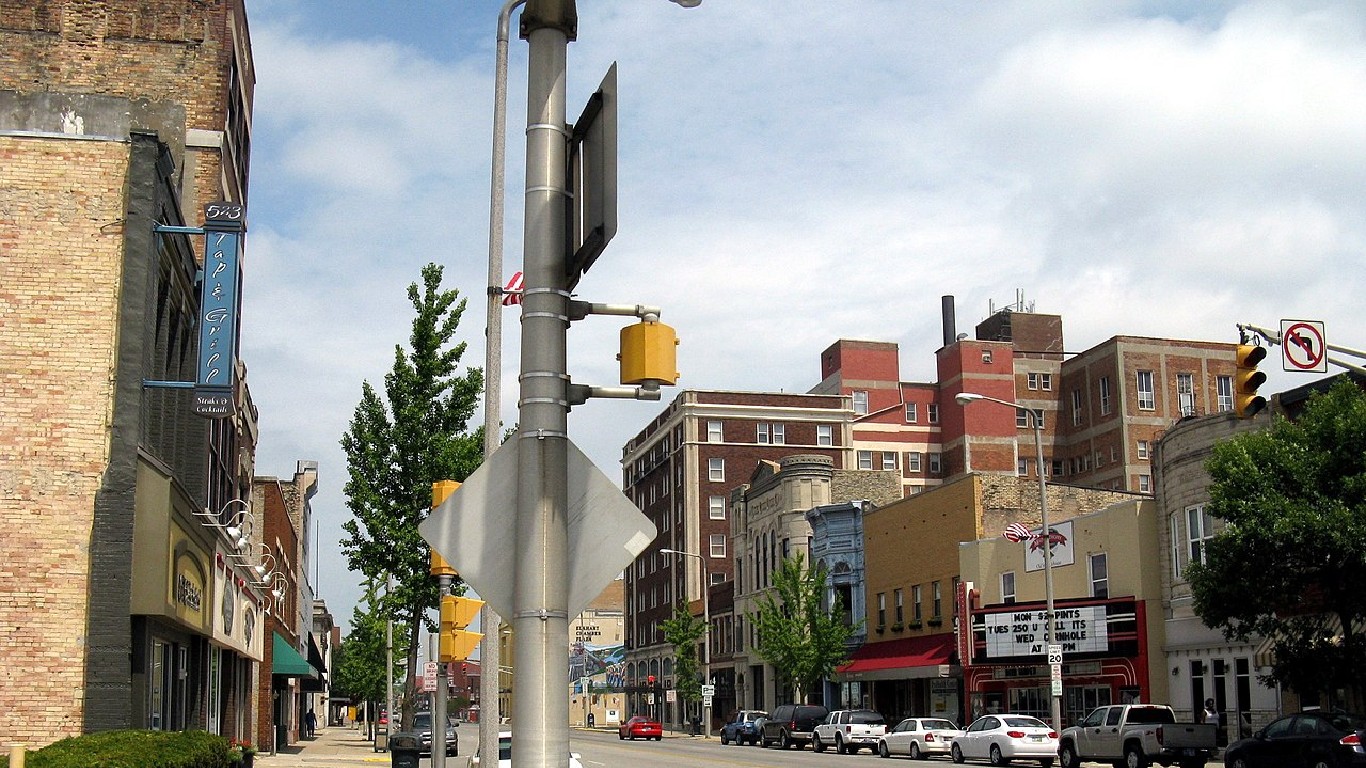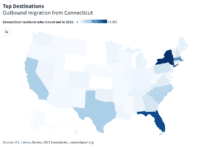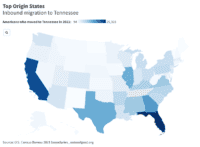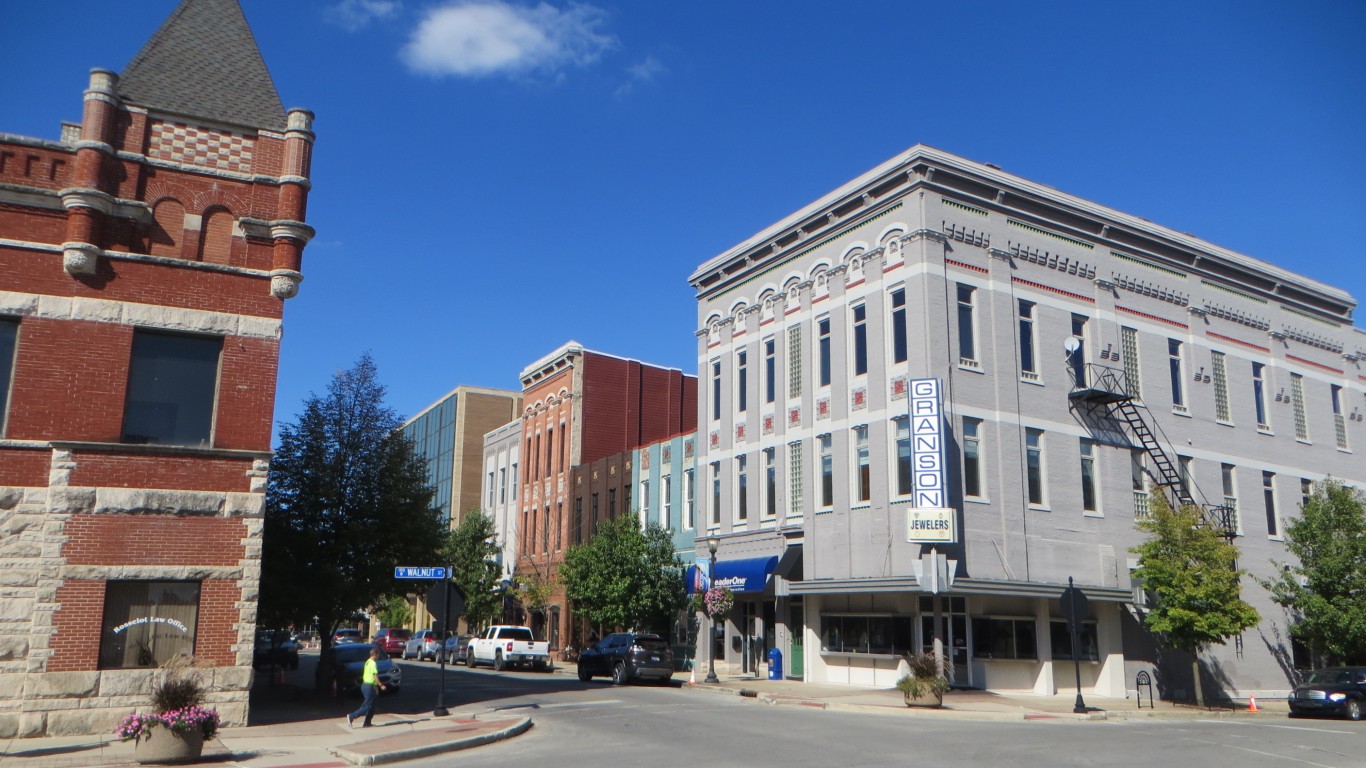
The United States has one of the most complex economies in the world. The country’s economy does not rely on one single industry, producing billions of dollars worth of products and services in many industries, including oil and natural gas, tech, vehicles, food, medicine, textiles, financial, entertainment, and much more each year.
Yet within the U.S., there are a number of major metro areas that are just the opposite – totally reliant on one industry. The dominant industry in each of these cities is the lifeblood of the local economy, accounting for anywhere between a third to over 50% of the metro area’s GDP.
To determine the major cities dominated by one industry, 24/7 Wall St. reviewed data on gross domestic products in current dollars from the U.S. Bureau of Economic Analysis. Metropolitan areas were ranked based on the percentage of total GDP represented by one industry sector.
Eight of the 10 metro areas on this list are Midwestern cities in which the dominant industry is manufacturing. Even as manufacturing jobs have declined sharply in the U.S. in recent decades, these cities are still home to thousands of manufacturing jobs – typically from one major company.
These jobs tend to pay very well. In each city on this list, the average earnings in the dominant industry is well above the overall average across the metro area. In fact, workers in these industries sometimes earn more than double what the average area worker does. These are the best paying jobs in America.
Click here to see the major cities dominated by one industry
Click here to see our detailed methodology
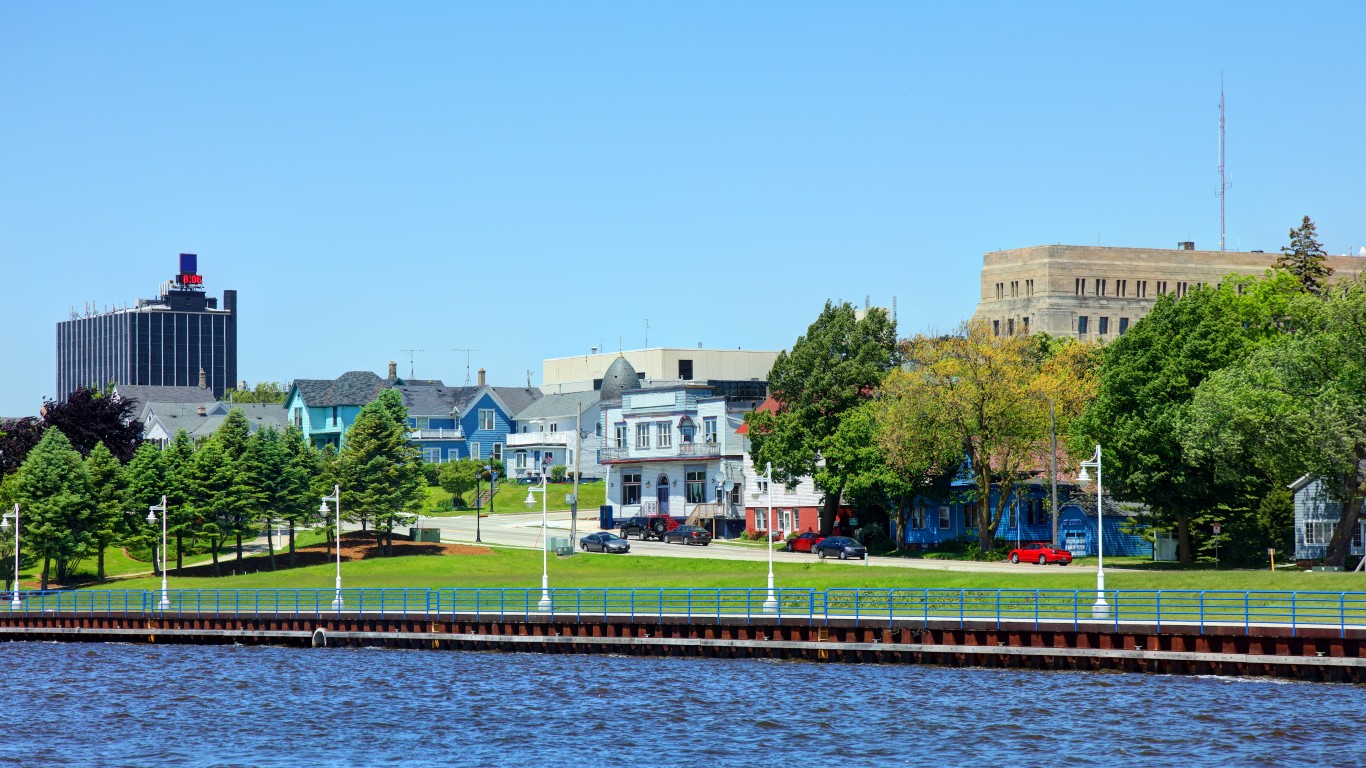
10. Sheboygan, WI
> Dominant industry: Manufacturing (37.7% of GDP)
> Avg. earnings in dominant industry: $88,000 (1.6 times the MSA avg.)
> Employment in dominant industry: 21,134 (29.6% of total)
> Largest area employer: Kohler Company
Manufacturing is by far the largest industry in the Sheboygan metro area in eastern Wisconsin, accounting for 37.7% of the area’s GDP. For context, manufacturing makes up just 10.9% of the U.S. GDP. Finance and insurance is the only other sector in Sheboygan that accounts for even a 10th of the local GDP.
Nearly 30% of all workers in the Sheboygan area, over 21,000 people, work in the manufacturing sector. More than 7,000 of these employees work at Kohler, which has its engine and generator manufacturing operations in Sheboygan County.
[in-text-ad]

9. Kankakee, IL
> Dominant industry: Manufacturing (40.2% of GDP)
> Avg. earnings in dominant industry: $100,776 (2.0 times the MSA avg.)
> Employment in dominant industry: 7,345 (13.7% of total)
> Largest area employer: CSL Behring
Kankakee, Illinois, which is about 50 miles south of Chicago, relies heavily on the manufacturing industry. More than 40% of its GDP comes from the manufacturing sector. Manufacturing jobs in the area tend to be high paying. Industry workers in Kankakee have average earnings over $100,000 per year – roughly double what the average worker in the metro area takes home.
Biopharmaceutical company CSL Behring is the largest employer in the area, employing over 1,500 area residents. The company largely focuses on plasma and other therapeutics to treat blood disorders such as hemophilia.
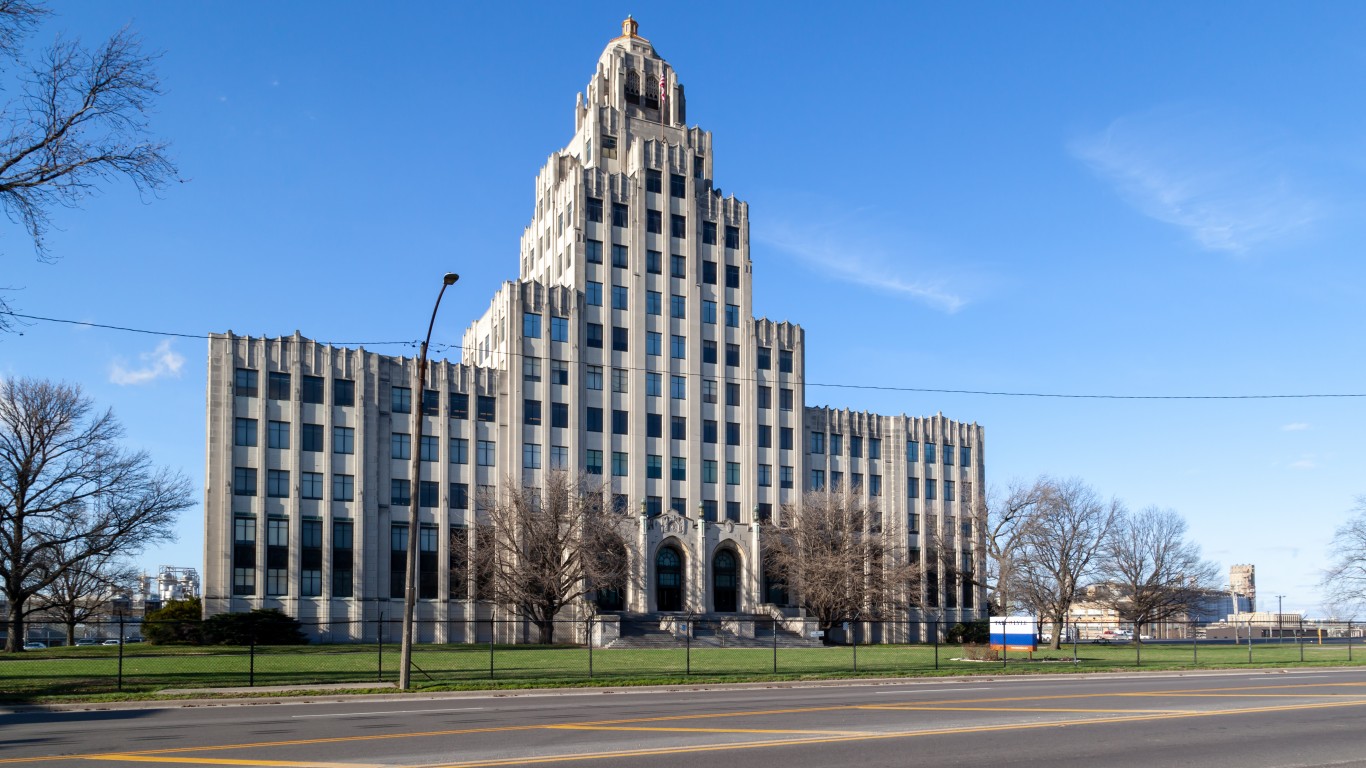
8. Decatur, IL
> Dominant industry: Manufacturing (40.6% of GDP)
> Avg. earnings in dominant industry: $104,906 (1.8 times the MSA avg.)
> Employment in dominant industry: 10,767 (19.0% of total)
> Largest area employer: Archer Daniels Midland Corporation
The Decatur metro area in central Illinois is one of several Midwestern population centers that heavily relies on the manufacturing sector. The industry accounts for more than 40% of the area’s GDP, and nearly one out of every five area jobs is in manufacturing.
The largest employer in Decatur is Archer Daniels Midland Corporation, a multinational food and related services producer. The company was headquartered in Decatur until 2014, when it relocated to Chicago. Still, the company employs over 4,000 people in the area. Employees at ADM and others in the manufacturing sector average over $104,000 in income per year, well above the average income across all industries.

7. Beaumont-Port Arthur, TX
> Dominant industry: Manufacturing (41.0% of GDP)
> Avg. earnings in dominant industry: $140,369 (2.4 times the MSA avg.)
> Employment in dominant industry: 20,366 (10.2% of total)
> Largest area employer: ExxonMobil Corporation
Though the manufacturing industry in the Beaumont-Port Arthur metro area in southeastern Texas employs 10.2% of the workforce, it accounts for 41% of the total GDP. This is equivalent to over $10 billion of the area’s $24.5 billion GDP.
The large manufacturing industry in the Beaumont area is also one of the highest-paying sectors in the region. The average employee earns over $140,000 per year, well above the average income of about $57,500 for all sectors in the area.
[in-text-ad-2]
6. Kokomo, IN
> Dominant industry: Manufacturing (45.2% of GDP)
> Avg. earnings in dominant industry: $96,395 (1.9 times the MSA avg.)
> Employment in dominant industry: 10,963 (24.1% of total)
> Largest area employer: Chrysler
Like many other Midwestern metro areas, Kokomo, Indiana’s economy is highly dependent on the manufacturing industry. More than 45% of the area’s $4.2 billion GDP comes from manufacturing.
Kokomo is home to a newly-opened Stellantis engine factory that will, at full capacity, employ 1,200 people. Stellantis, Chrysler’s parent company, produces engines and other parts for Jeep, Chrysler, Ram, and Dodge vehicles. These engine manufacturing jobs tend to pay well, and manufacturing workers in the Kokomo area have an average income nearly double the average income of all area workers.

5. Midland, TX
> Dominant industry: Mining, quarrying, and oil and gas extraction (48.2% of GDP)
> Avg. earnings in dominant industry: $334,328 (4.3 times the MSA avg.)
> Employment in dominant industry: 36,536 (25.6% of total)
> Largest area employer: Pioneer Natural Resources
The Midland metro area in West Texas gets nearly half of all its economic activity from the mining, quarry, and oil and gas extraction industry, adding up to over $10.5 billion. More than 36,500 area workers have jobs in the industry, accounting for over a quarter of employment.
The oil and natural gas industry tends to pay high wages. Workers in this field have an average annual income of $334,328 – more than four times higher than the average earnings of under $77,000 across all workers in the metro area.
[in-text-ad]

4. Lima, OH
> Dominant industry: Manufacturing (50.6% of GDP)
> Avg. earnings in dominant industry: $92,714 (1.8 times the MSA avg.)
> Employment in dominant industry: 8,638 (14.4% of total)
> Largest area employer: Ford Motor Company
Lima, Ohio, is one of just four major metro areas in which over half of the total GDP is attributable to one industry – manufacturing. Manufacturing accounts for $2.1 billion out of the area’s $4.1 billion GDP. The average earnings of manufacturing workers is over $92,000 per year, well above the typical annual earnings in the Lima area.
Ford Motor Company employs over 1,500 workers at its Lima Engine Plant. For context, there are just over 50,000 total workers in the metro area overall. The plant has been in operation for more than 60 years
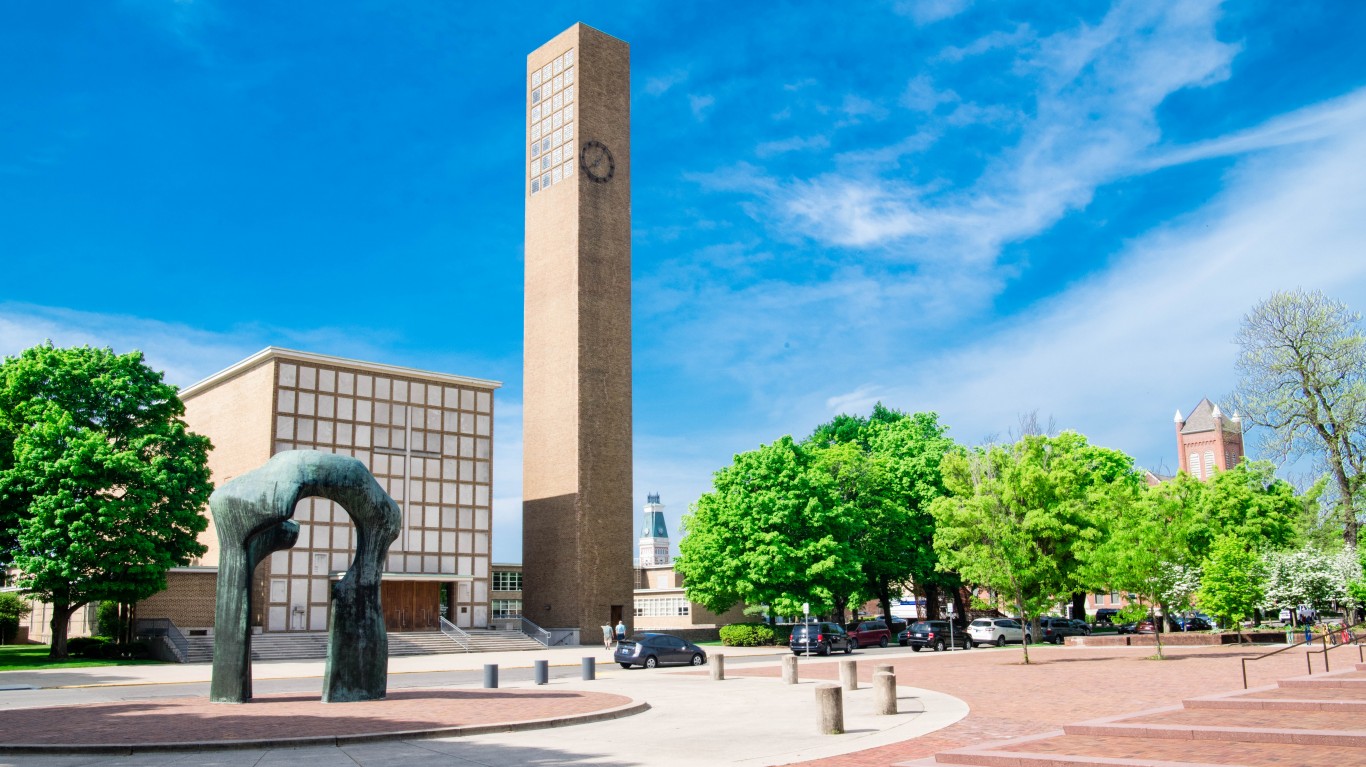
3. Columbus, IN
> Dominant industry: Manufacturing (52.3% of GDP)
> Avg. earnings in dominant industry: $96,886 (1.6 times the MSA avg.)
> Employment in dominant industry: 18,558 (32.1% of total)
> Largest area employer: Cummins Inc.
Manufacturing accounts for more than half of all economic activity in the central Indiana metro area of Columbus. The sector accounts for 52.3% of its $6.6 billion GDP. No other industry accounts for even 8% of the GDP.
Engine manufacturer Cummins was founded in Columbus in 1919. It is still headquartered there over a century later and employs more than 8,000 people in the metro area, making it by far the largest employer in the region.

2. Bloomington, IL
> Dominant industry: Finance and insurance (52.7% of GDP)
> Avg. earnings in dominant industry: $118,016 (1.9 times the MSA avg.)
> Employment in dominant industry: 23,494 (22.2% of total)
> Largest area employer: State Farm Insurance Company
The economy of Bloomington, Illinois, depends mostly on the finance and insurance industry – State Farm in particular. The major insurance provider accounts for the majority of the 23,494 finance and insurance jobs in the area. Workers in this sector earned an average of over $118,000 per year, nearly double the average for all workers in the Bloomington metro area.
State Farm, which is headquartered in Bloomington, is the nation’s largest auto insurance provider. The company reported revenue of nearly $78.9 billion in the latest fiscal year, ranking 39th on the Fortune 500 list of America’s largest companies.
[in-text-ad-2]
1. Elkhart-Goshen, IN
> Dominant industry: Manufacturing (54.2% of GDP)
> Avg. earnings in dominant industry: $75,994 (1.4 times the MSA avg.)
> Employment in dominant industry: 62,709 (41.2% of total)
> Largest area employer: Norfolk Southern
No American metro area is as dependent on any single industry as the Elkhart-Goshen metro area of Indiana is on manufacturing. The sector accounts for 54.2% of the local GDP. Nationwide, the sector accounts for just 10.9% of the U.S. GDP.
More than 40% of Elkhart-Goshen area workers are employed in the manufacturing sector. These workers earn an average of nearly $76,000 per year – almost 40% higher than the average earnings of all area workers. The largest employer in the area is freight company Norfolk Southern.
Methodology
To determine the major cities dominated by one industry, 24/7 Wall St. reviewed data on gross domestic product in current dollars from the U.S. Bureau of Economic Analysis. Metropolitan statistical areas were ranked based on the percentage of total GDP represented by one industry sector using the North American Industry Classification System.
Supplemental data on employment and average earnings by industry sector also came from the BEA. BEA data was aggregated from the county level to the metropolitan statistical area level using boundary definitions from the U.S. Census Bureau. Data on the largest employer in each metro area came from various city comprehensive annual financial reports and other government filings.
100 Million Americans Are Missing This Crucial Retirement Tool
The thought of burdening your family with a financial disaster is most Americans’ nightmare. However, recent studies show that over 100 million Americans still don’t have proper life insurance in the event they pass away.
Life insurance can bring peace of mind – ensuring your loved ones are safeguarded against unforeseen expenses and debts. With premiums often lower than expected and a variety of plans tailored to different life stages and health conditions, securing a policy is more accessible than ever.
A quick, no-obligation quote can provide valuable insight into what’s available and what might best suit your family’s needs. Life insurance is a simple step you can take today to help secure peace of mind for your loved ones tomorrow.
Click here to learn how to get a quote in just a few minutes.
Thank you for reading! Have some feedback for us?
Contact the 24/7 Wall St. editorial team.
 24/7 Wall St.
24/7 Wall St.